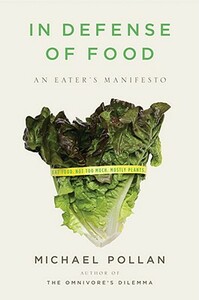You need to sign in or sign up before continuing.
Take a photo of a barcode or cover
Truly eye-opening. A great read for anyone living in American and eating the standard Western diet. Pollan is a great journalist. His writing is informative as well as captivating and he doesn't get too doomsday on you. Read it if you care about your health and that of future generations.
hopeful
informative
reflective
medium-paced
I'm sure I read this once before, but I guess I didn't mark it here. I am even more fed up with "nutrition guidelines" than I was then, so I liked this book even more. New focus: eat food. And way more plants.
I think I'm a convert. I'm a big time mindless eater and I think I finally get it. I'm not a conspiracy nut or even anti-corporation, but dang. We have food completely wrong. It's been made overly complicated and it doesn't need to be. I love it. Now, let's see if I can live. Now I'm off to eat a Twinkie....an organic, free-range, locally-sourced one of course.
some interesting scientific study data included, but could have been written in a couple of pages, or summed up by the first 2 sentences. nothing relevatory here.
Pollan reveals the the facade of nutrtionism for what it really is: food capitalism. We do not need food products; we need food. Pollan's manifesto feels elegant in simplicity, romantic in its reverence for vegetables, and thoroughly well researched. An uncomplicated mantra to shop by: "eat food. Not too much. Mostly plants."
Got a signed copy. Will have to read [b:The Omnivore's Dilemma|3109|The Omnivore's Dilemma|Michael Pollan|http://photo.goodreads.com/books/1192945129s/3109.jpg|3287769] next: this one is great! Pollan argues that the scientifically based and politically reinforced shift to thinking about food in terms of their nutrients (a phenomenon he and others call "nutritionalism") allows processed foods to claim health benefits above and beyond natural foods because you can basically add or subtract anything from them. Margarine is an example Pollan uses repeatedly: it was developed and popularized in the '50s and '60s when cholesterol and saturated fats were demonized (which also spawned the mass production of breakfast cereals). When trans fats were later identified as being worse than saturated, margarine got reconfigured to absolve it of that sin. You can add fiber and any number of vitamins to processed foods, etc., -- but the science of food is always changing and often contradictory. How can we be sure that the benefits of a particular food, say, an orange, are all captured in its fiber and vitamin contents, and that these benefits can be replicated with supplements?
Anyway, in the last section of the book Pollan will offer his perspective on how to implement his manifesto to "eat food. Mostly plants. Not too much," while reclaiming the cultural and otherwise pleasurable aspects of eating that have been left in the shadow of the global (and, in particular, American) "unhealthy obsession with healthy eating." Looking forward to it!
Note: Changed to 4 stars because of the repetition.
Anyway, in the last section of the book Pollan will offer his perspective on how to implement his manifesto to "eat food. Mostly plants. Not too much," while reclaiming the cultural and otherwise pleasurable aspects of eating that have been left in the shadow of the global (and, in particular, American) "unhealthy obsession with healthy eating." Looking forward to it!
Note: Changed to 4 stars because of the repetition.
challenging
informative
medium-paced
This is best read as a sequel to Omnivore's Dilemma, touching on, and expanding on, some ideas that he began discussing in Dilemma. In this very engaging book, mixing his very well-researched writing with his very readable style, he investigates what "food" is, and how our concept of food has changed over the decades, and how that has effected ourselves and our health - and society as a whole.
A thoughtful and engaging book that is worth reading for anyone interested in health, nutrition, or food.
A thoughtful and engaging book that is worth reading for anyone interested in health, nutrition, or food.



